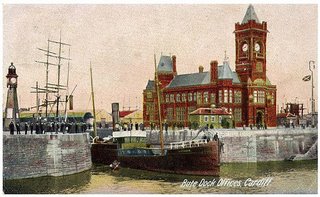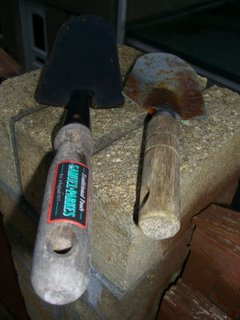 What would a Sunday be like if there wasn’t a film to keep us quiet? It was with a childish excitement that I looked forward to ‘Pirates of the Caribbean: Dead Man’s Chest’ – an opportunity to wallow in spectacular rubbish and be unaccountably moved by the potency of the cheap music which accompanied it.
What would a Sunday be like if there wasn’t a film to keep us quiet? It was with a childish excitement that I looked forward to ‘Pirates of the Caribbean: Dead Man’s Chest’ – an opportunity to wallow in spectacular rubbish and be unaccountably moved by the potency of the cheap music which accompanied it.I was reminded from time to time, as I watched the film, of my responses to ‘The Devils of Loudun’ a film by Ken Russell. It was a remarkable film of considerable visual intensity, but I watched it with incredulity; to me it seemed as if Ken Russell and his motley crew had been wandering though Pinewood or wherever and suddenly come across this fantastic set and turned to the people who were with him as said, “Look, there’s no one here; why don’t we make a film?” And so, like a group of naughty schoolboys, they took advantage of the grown ups absence and make a thoroughly self indulgent film. And that is ‘Dead Man’s Chest’: a thoroughly self indulgent film with no grown ups to say to the director (it had a director?) you mustn’t do that; your audience has rights as well as you.
There are two writers credited with this farrago of nonsense and presumably, considering the amount of money lavished on his production, there must have been somebody asking, “Why are we doing this bit of the story now, because it doesn’t really make sense if we try and link it with that last bit?” Alas, the adults with narrative integrity were all at lunch, and the wayward kids were able to do as they liked.
What I am trying to say is that this episode (Part III – ‘Pirates of the Caribbean: The End of the World’ couldn’t have been more clearly indicated by the non ending of the film) could hardly be described as a triumph of narration. Story strands appeared from nowhere and went nowhere all to end up (you’ve guessed it) nowhere! Commander Norrington? I’m sorry? Where the hell did he come from? Was it all part of the contracts of anyone who appeared in part one that they had to appear in part two? Unbelievable in oh so many ways!
It might be fair to say that to look for narrative integrity in something which is based on a fairground ride is asking too much. But the first episode did have a strong theme, well stated with humour and panache.
Well, we did have some humour in an atmosphere of total camp. The mincing performance of Captain Jack Sparrow has now gone beyond caricature into another realm of something which is only tangentially related to acting!
The set pieces of the action in the film are very well presented. Some scenes have all the verve of a much better production: one which actually is greater than the sum of its parts – but that isn’t this one.
At its best this film does not rise above pantomime and cartoon, which at least is an homage to its entertainment roots.
There are far too many ideas in this episode: cannibals, strange voodoo women, discredited commodores, free wheeling mill wheels, Davy Jones, the Kraken, fights, action, it’s all too much, giving the impression that it was made up as it went along.
 The acting almost defies categorization: it’s easier to talk about prosthetics and scenery – at least we are on safe ground there!
The acting almost defies categorization: it’s easier to talk about prosthetics and scenery – at least we are on safe ground there!As ever the music is fantastic, but somewhat repetitive; it’s as if the composer realised when he was onto a good thing and then plugged it for all he was worth.
Did I enjoy the film? Up to a point! It is easy to see that lots of people had fun making it: the tragedy is that the enjoyment does not always add to the spectator’s enjoyment of the production as a film for which they have paid hard earned cash.
One critic noted of this film that it didn’t matter what he said, the film was obviously going to make shed loads of money! In my view, this is where the director had a duty of care towards the paying public. He knew he had a hit, he could have experimented with his subject matter, taken a few chances and perhaps taken his faithful (paying) audience a little bit further in a cinematic sense, but, there you are, I’m being idealistic again!
 On to more mundane things: I am beginning to realise that there is a whole sociology of putting things away after going to the supermarket. It is a process which is fraught with dangers and difficulties from the disposal of the surplus plastic bags to who puts away the stuff in the freezer.
On to more mundane things: I am beginning to realise that there is a whole sociology of putting things away after going to the supermarket. It is a process which is fraught with dangers and difficulties from the disposal of the surplus plastic bags to who puts away the stuff in the freezer.Don’t know about you but there is a definite hierarchy of difficulty in the way in which things are put away. It’s almost like those competition divers: when they only do a straight dive then the tariff for the dive is quite low, but, when they are doing things before they hit the water that a number of years ago would have found them being burnt at the stake because of the ostentatious defying of Newtonian gravity, the tariff is quite high. In the same way there is a tariff for placing items in their appropriate places.
Take for example eggs. Eggs go (in our unenlightened domicile) in the fridge. How they go in the fridge is part of the ‘difficulty’ rating of the exercise. If there are eggs left from the last purchase, do you add the eggs to the old container; do you cut the container down to maximise space; do you place the new container in the fridge thus having to move other things around to find sufficient room or do you have another solution? There are no right answers, only answers which are woefully inadequate when your partner sees what you have done. That’s a simple example.
What do you do when you have something frozen? If your freezer is anything like mine then it will be full at all times. Any extra purchase will, therefore, necessitate the wholesale rearrangement of the freezer drawer at best or the whole fridge at worst. Frozen items are best ignored. So the best plan is to utilize your whole arsenal of displacement activities in the vain hope that The Other will weaken and take the things to the fridge with the implicit acceptance of rearrangement. Today, for example, I put bleach in the sink, cleaned the sink surround, filled the dishwasher and cleaned the taps – the last one mentioned being a sure sign of desperation. He weakened. Result!
Fresh fruit (keeping bananas apart; taking the little stickers off the apples; deciding where to put the grapes etc.) has problems too numerous to catalogue fully. Salad always forces crisis decisions about the efficacy of so-called fresh food chilled compartments which are of varying efficiency. Tins – made in wilfully, playfully, infuriatingly different, non-stackable sizes create vast problems before the decisions about where to place them come into play: by type, by size, by use, by God, it’s never easy.
There ought to be a special late start on Mondays for those benighted folk who go supermarket shopping together on a Sunday, so that the enormity of decisions made on the hoof on a lazy weekend Sunday can be considered more carefully on a careworn weekday. Then, and only then, can considered agreements be entered into to sort out misalignments of tins, wrong placements of salad and jammed contents of freezers so that a placid week can be enjoyed by all.
You know it makes sense.















































